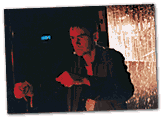CUTTING LOOSE
Noah Cowan on Mark Pellington's Going All The Way
Mark Pellington's best-known work, from his monumental PBS anthology The United States Of Poetry to his award-winning music videos - Pearl Jam's "Jeremy," U2's "One" - has been marked by edgy yet accessible experimentation within traditional forms. So too with Going All The Way, his impressive first feature film premiering in Sundance's Dramatic Competition.
A coming-of-age story based on the eponymous book by Dan Wakefield (who also wrote the screenplay), it concerns two young men returning to Indianapolis after the Korean War. Sonny is shy and awkward, Gunner a strapping, athletic ladies man. Dis-gusted with strictured Midwestern life, they rebel, upsetting the people around them.
 While this synopsis may seem like the premise of a 1950s feel-good movie, Going All The Way insistently subverts any evoked nostalgic feelings. Its twisting narrative veers from relatively straight (although ennui-laden) jocular boy talk to surreal trips into Sonny's disturbed inner world, culminating in a profound and painful moment of sexual humiliation. (A tour-de-force performance by Spank-ing the Monkey's Jeremy Davies beautifully rides this unusual rhythm; apparently he sent Pellington an aphoristic nine-page letter to secure the part.)
While this synopsis may seem like the premise of a 1950s feel-good movie, Going All The Way insistently subverts any evoked nostalgic feelings. Its twisting narrative veers from relatively straight (although ennui-laden) jocular boy talk to surreal trips into Sonny's disturbed inner world, culminating in a profound and painful moment of sexual humiliation. (A tour-de-force performance by Spank-ing the Monkey's Jeremy Davies beautifully rides this unusual rhythm; apparently he sent Pellington an aphoristic nine-page letter to secure the part.)
Pellington says, "It's a traditional story that we chose to tell in a different fashion. It's straighter than I first imagined it and definitely could have been much darker. We could have dealt much more with the relationship between Sonny and his mother, but chose to focus more on Sonny's self image as a kind of lonely character study. It plays now more as a realistic drama with comic elements."
Working with novelist and screenwriter Wakefield was a pleasure. "He said we captured the essence of his book," says Pellington. "I had read the novel in college. When people asked me if I wanted to make a film, I would give them the book and invariably hear that it was too interior. But after the Poetry show, I felt I could make a film from anything! In 1991, after Tom [Gorai, the film's producer] and I started working together, we realized we shared a connection to the book. Joni Sighvatsson at Propaganda was also a fan and gave us development money."
According to Gorai, "When we met him, we were amazed to discover that the book had been optioned several times, by people like Alan Pakula and Tony Bill. After an intense session in Miami, we had a script by Spring '95. Mark's agency embraced it, but Joni left Propaganda. To the company's credit, as soon as they realized they couldn't make it right away, they turned it around to us and we took it to Joni's new company, Lakeshore."
"Originally we had conceived of the film with a full-on period look, with lots of cars and period props," remembers Pellington. "We saw it at $9 million. Needless to say, we made it for considerably less."
Noah Cowan is a Contributing Editor of FILMMAKER Magazine.
VOD CALENDAR


 See the VOD Calendar →
See the VOD Calendar →


